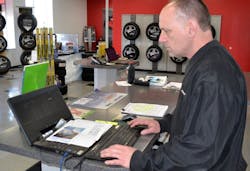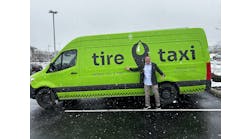This MTD exclusive was provided by Dennis McCarron, a partner at Cardinal Brokers, one of the leading brokers in the tire and automotive industry (www.cardinalbrokers.com).
Imagine running a tire dealership and not knowing what is in stock or what sales have been for the month - tirelessly writing up invoices as customers come in and hoping that at the end of the day you’ve made some profit.
Sounds ridiculous, right?
If you ask most tire dealers, whether they have one year or 25 years in the business, “How many units did you sell yesterday or last month or last year?” they will rattle off a very accurate number. Reviewing sales data is one of the most common tasks an owner will do.
But when asked, “What was your net profit last month?” many owners will sheepishly say their accountants haven’t gotten them the numbers yet. In my experience, many owners don’t get their P&L statements until 45 to 60 days after the month closes.
This is like using a credit card where you have no knowledge of its balance or the limit that is available to you. It’s insanity!
Selling products and labor over cost does not guarantee that a business is profitable. A professional in this industry must know not only their gross profit margins, but what expenses were booked into every month - most importantly payroll. The only way you will get all of that done is by reviewing your P&L statement. And it is extremely important you review it in a timely manner.
Sales and gross margins are some of the most predictable elements of running a business. Depending on what part of the country you are in, you will know instinctively the slow times and the busy times for your dealership. Vacations, school and weather are three of the driving factors that are out of your control. In-store experience and advertising are the top two within your control.
Take, for example, a store that sells $100,000 a month reliably. (And if it’s an average store, it likely returns about $5,000 in net profit a month.) Say a few workers start to take liberties, like clocking in before getting changed or lingering after closing before clocking out.
If three employees add five hours to the end of their work week each week, including overtime, at the end of the month, your profit will have dropped by $1,350. Or maybe there was a big comeback your manager didn’t want to tell you about and he expensed it. Maybe sales were a little soft and payroll stayed the same.
Maybe all of those things happened at the same time. There are thousands of reasons why a store can go from being profitable to unprofitable. And if you only find out about it two months later, guess what has happened over that time, as well? Maybe think about it this way — if your accountant delays your P&L statement by 60 days after the close of the month, a sizable percentage of the year is over and you have no idea if you made any money!
“It’s so hard to find a good accountant!” you say. I know. And I agree that it is hard to find a good accountant. But that doesn’t mean you should stop looking. One of the keys is to get your expectations laid out up front. The accountant expects you to pay him or her on time and for a fixed amount and doesn’t hide that. You shouldn’t hide your expectations, either. I firmly believe that receiving your P&L statement 15 to 20 days after close is not unreasonable in today’s age. And if that is flat-out impossible, you should invest in tracking all of your expenses in-house so you have the equivalent of a preliminary P&L - one that is close to actual numbers, but may take a few minor adjustments.
And let’s not just point fingers at accountants. Good leaders look in the mirror, as well. Is there anything being done or not being done that is preventing the accountant from getting on top of producing your P&L statement quickly? Is there a process in-house that could expedite getting all the information over to your accountant more quickly? Remember, as an owner, you are not in the tire business anymore -your employees are. You are in the business of business: staffing, hours, marketing, advertising, expense control, purchasing agreements, contracts with vendors -the list goes on.
Do not give up looking for the best accountant you can find. And just because it was dad’s accountant or the accountant who does your personal finances doesn’t mean they are allowed to let you run your business blind. Make the tough decisions that owners are supposed to make. And since we are spending some time discussing expenses, I’d be remiss if I didn’t remind you to keep your payroll to a max of 50% of gross profit and keep non-payroll expenses to 20% of sales. I know I beat this point like a drum, but I like the tune.


